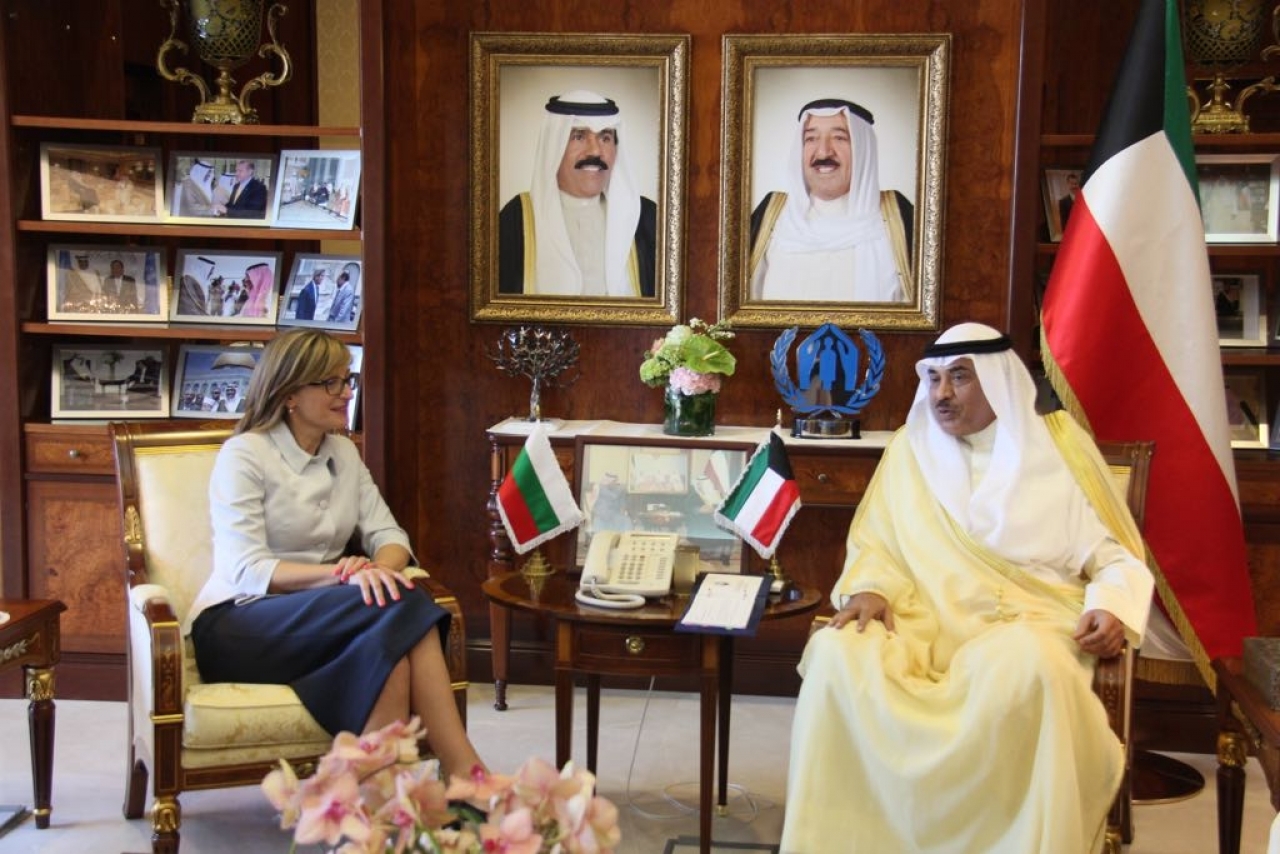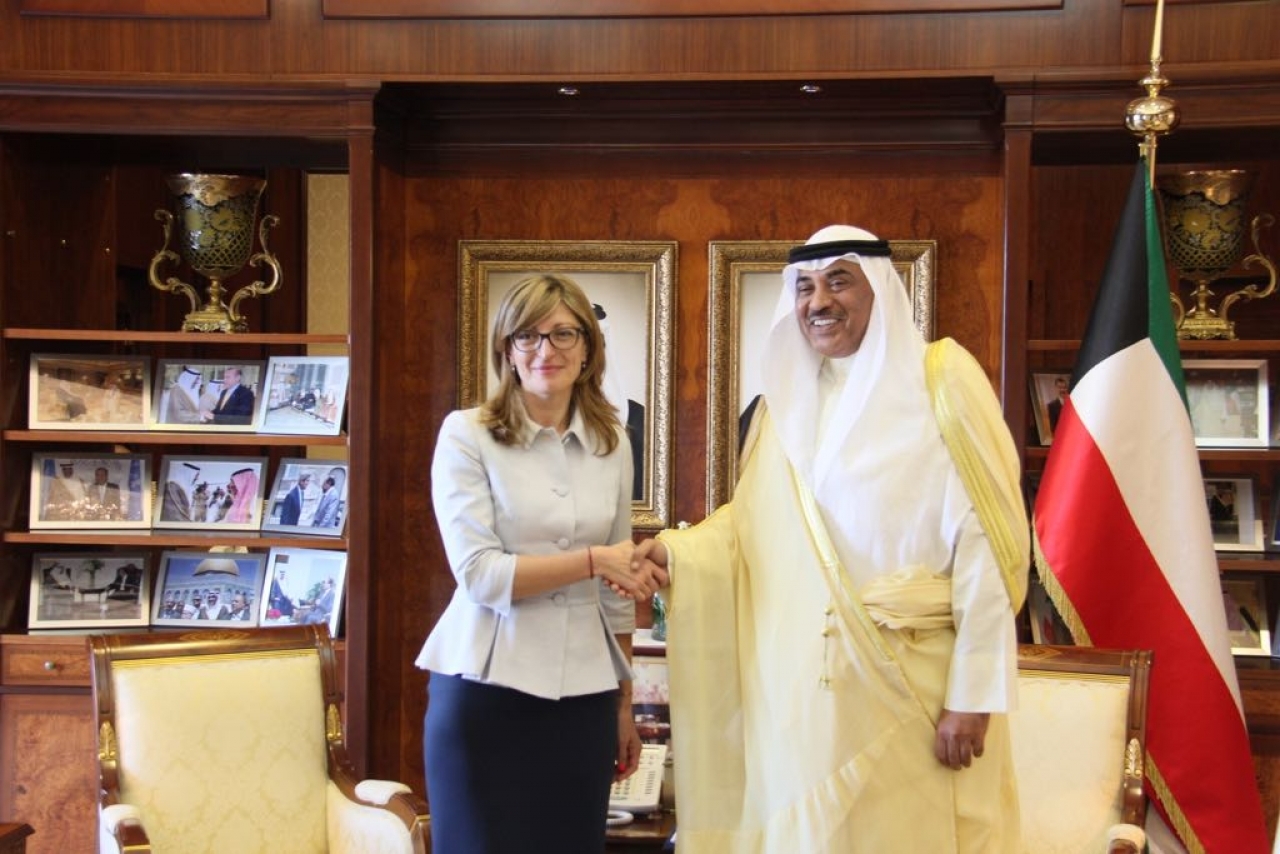In Kuwait, Deputy Prime Minister Zaharieva presented investment and tourism conditions in Bulgaria
15 November 2017 News
Deputy Prime Minister and Minister of Foreign Affairs Ekaterina Zaharieva presented the conditions for investment and tourism in Bulgaria to the Government of the State of Kuwait. “We have long-standing political contacts, but economic relations still lag far behind our actual capacities. We have a potential to cooperate in tourism, high technology, trade in foods and medicines,” Zaharieva told the Prime Minister, Sheikh Jaber Al-Mubarak Al-Hamad Al-Sabah. On behalf of Prime Minister Boyko Borissov, she invited the Kuwaiti head of government to pay a visit to Bulgaria.
Minister Zaharieva presented the opportunities for future cooperation: she stressed that our country has at its disposal the largest per capita number of IT specialists in Europe, as well as that a number of Bulgarian business start-ups attract the interest of investors worldwide. Regarding tourism, she emphasised that Bulgaria has the third richest cultural heritage on the Old Continent after Greece and Italy, ranks second in the number of mineral springs, and the number of tourists arriving annually already exceeds Bulgaria’s population. Zaharieva also presented the conditions for investment in her country and the measures that the Bulgarian Government is taking to reduce the administrative burden on business. “I support all steps that would improve our relations. Please invite on my behalf Prime Minister Borissov to visit Kuwait, too,” Sheikh Jaber Al-Mubarak replied.
Zaharieva is the first Bulgarian foreign minister to visit the State of Kuwait since Bulgaria’s admission to the EU. This is also the first visit by the Bulgarian Deputy Prime Minister to an Arab World country. The trip is coming at a time of exceptionally dynamic political developments in the region, a day after the Turkish President’s visit and two days after the arrival of the Egyptian Foreign Minister.
At a session with her Kuwaiti counterpart, the First Deputy Prime Minister and Minister of Foreign Affairs Sheikh Sabah Al-Khalid Al-Sabah, the chief Bulgarian diplomat discussed ways in which the two countries can cooperate within the framework of the Bulgarian Presidency of the EU Council and the rotating Kuwaiti Presidency of the Gulf Cooperation Council (GCC). The two foreign ministers agreed to organise political consultations to particularise the potential areas of bilateral cooperation. It was also agreed that the Joint Bulgarian-Kuwaiti Intergovernmental Trade and Economic Commission will meet to map out concrete measures for interaction.
Zaharieva and Sabah Al-Khalid agreed to work towards an EU-GCC high-level meeting, and stressed that the Gulf countries’ trade with the EU totals 184,000 million US dollars. “Bulgaria and Kuwait share the same values and views about the international agenda and the world,” Sheikh Sabah found. The First Deputy Prime Minister said that he feels Bulgaria especially close because he was coached by a Bulgarian when he was a volleyball player. “Thank you for your staunch support for the international anti-terrorist coalition and for your concrete, principled and balanced position on the complicated political problems in our region. We appreciate it as support for our efforts towards addressing these issues through dialogue,” the Kuwaiti Foreign Minister stressed. He and Zaharieva considered the situation in Iraq, Iran, Libya and Syria, as well as a number of other topics on the international agenda.
Zaharieva also conferred with Deputy Prime Minister and Minister of Finance Anas Khalid Al-Saleh, who chairs the Management Board of the world’s fifth largest investment fund. Predictably, the talks focused on opportunities to attract investments to Bulgaria.
A meeting was also held with the Minister of Justice and Minister of State for National Assembly Affairs, Dr Faleh Abd Allah Al Azeb, with whom certain areas of potential interest in legal cooperation were outlined. At the end of her visit to the State of Kuwait, Deputy Prime Minister Zaharieva also met with the Bulgarian community in that country. Some 600 Bulgarians work here, mostly highly skilled specialists who enjoy public respect. Some of them shared the problems they encounter, and Minister Zaharieva promised to intervene for addressing them with the competent Bulgarian and Kuwaiti institutions.










